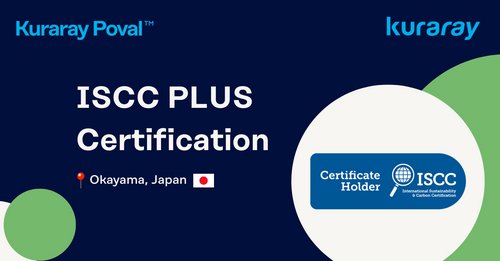 Kontakt
Kontakt
Sie haben Fragen oder suchen nach
dem richtigen Produkt?
Musterbestellung
Produktsuche
Erfahren Sie als Erstes von den neuesten Entwicklungen in unserem Produktportfolio rund um Polyvinylalkohol!
Jetzt abonnieren Kontakt
Kontakt
Sie haben Fragen oder suchen nach
dem richtigen Produkt?
26.09.2025
Establishment of a Certified Supply Chain for Five Vinyl Acetate-Related Products in Japan.

Kuraray Co., Ltd. (Headquarters: Chiyoda-ku, Tokyo; President: Hitoshi Kawahara) hereby announces that as of August 2025, five vinyl acetate-related products—vinyl acetate monomer (VAM), PVOH resin, PVOH film, EVOH resin, and EVOH film —produced at three plants in Japan; the Okayama, Kurashiki, and Saijo Plants have been certified under ISCC PLUS*1, an internationally recognized certification program for sustainable products. With this certification, Kuraray has established a certified supply chain in Japan starting with VAM produced at the Okayama Plant.
In January 2025, Kuraray established a certified supply chain between Europe and the United States, starting with VAM produced at the La Porte Plant in the United States. Today, the ISCC PLUS certified sites that manufacture products of the Vinyl Acetate Company of Kuraray now span eight locations across Europe, the United States, and Asia.
In an effort to reduce the carbon footprint of our products through the use of bio-based and recycled raw materials, Kuraray will further promote the sale of ISCC PLUS certified vinyl acetate-related products, which are allocated sustainable raw materials using the mass-balance approach*2.
ISCC PLUS Certification list – Vinyl Acetate Company
| SITE | Location | Output material(s) | SCOPE | Valid from |
| Okayama Plant | Okayama City, Okayama, Japan |
| Polymerization Plant; Specialty Chemical Plant; Final Product Refinement; Processing Unit, Converter; | Aug. 2025 |
| Kurashiki Plant | Kurashiki City, Okayama, Japan |
| Processing unit, Converter | Aug. 2025 |
| Saijo Plant | Saijo City, Ehime, Japan |
| Processing unit, Converter | Aug. 2025 |
| La Porte Plant, Kuraray America, Inc. | La Porte, Texas, U.S. |
| Specialty chemical plant | Nov. 2023 |
| Bayport Plant, Kuraray America, Inc. | Pasadena, Texas, U.S. |
| Specialty chemical plant | Jan. 2025 |
| La Porte, Plan, MonoSol, LLC | La Porte, Indiana, U.S. |
| Processing unit, Converter | July 2024 |
| Frankfurt Plant Kuraray Europe GmbH | Frankfurt, Germany |
| Polymerization Plant | Oct. 2024 |
| EVAL Europe N.V. | Antwerp, Belgium |
| Polymerization Plant | May 2022 |
| Kuraray Europe GmbH | Frankfurt, Germany | Trader with storage | Jan. 2024 |
Kuraray is implementing its medium-term management plan “PASSION 2026” as a five-year plan leading up to the centennial of its founding in 2026. The Company will continue to expand its lineup of products that contribute to the natural and living environments, with the aim of realizing the long-term “Kuraray Vision 2026,” namely, being a “Specialty Chemical Company growing sustainably by incorporating new foundational platforms into its own technologies and contributing to customers, society, and the planet.”
*1 ISCC PLUS:
International Sustainability and Carbon Certification (ISCC) is an internationally recognized certification program for sustainability and carbon emissions. ISCC PLUS is especially designed to ensure that certified items, which are bio-based or recycled raw materials and products marketed in the EU and elsewhere in the world, are properly managed throughout their supply chains in terms of sustainability and CO2 emissions.
*2 Mass-balance approach:
A method for assessing the sustainability of products made using multiple types of raw materials, including biomass and recycled raw materials as well as fossil-based raw materials. In this method, characteristics of sustainable raw materials (e.g., biomass and recycled raw materials) included in finished products are taken into account in a manner that reflects the proportional volume of such raw materials.
We pledge our commitment to comply with the ISCC PLUS requirements, in accordance with the latest ISCC regulations, and to avoid the practice of double counting our environmental contributions.

